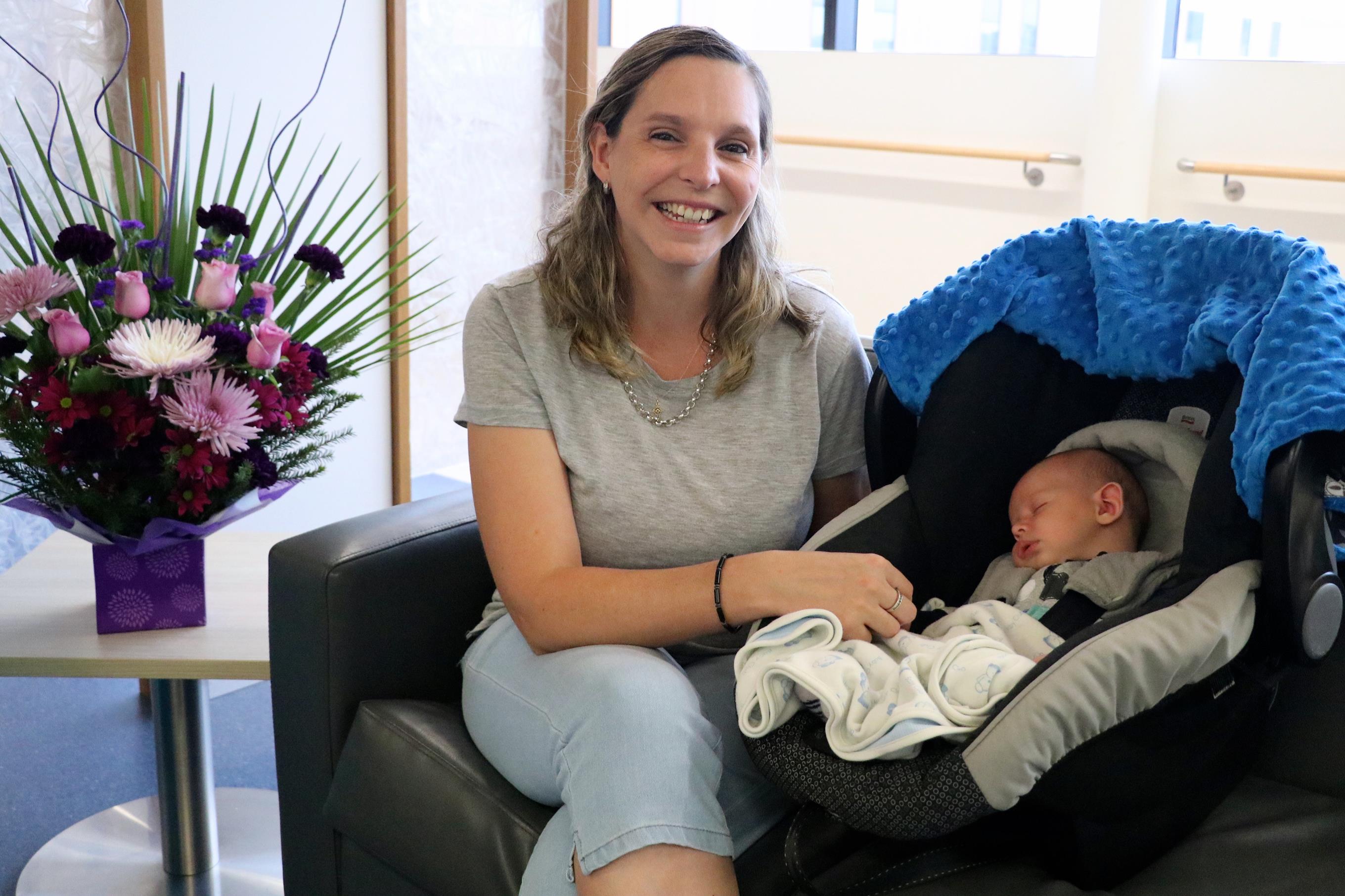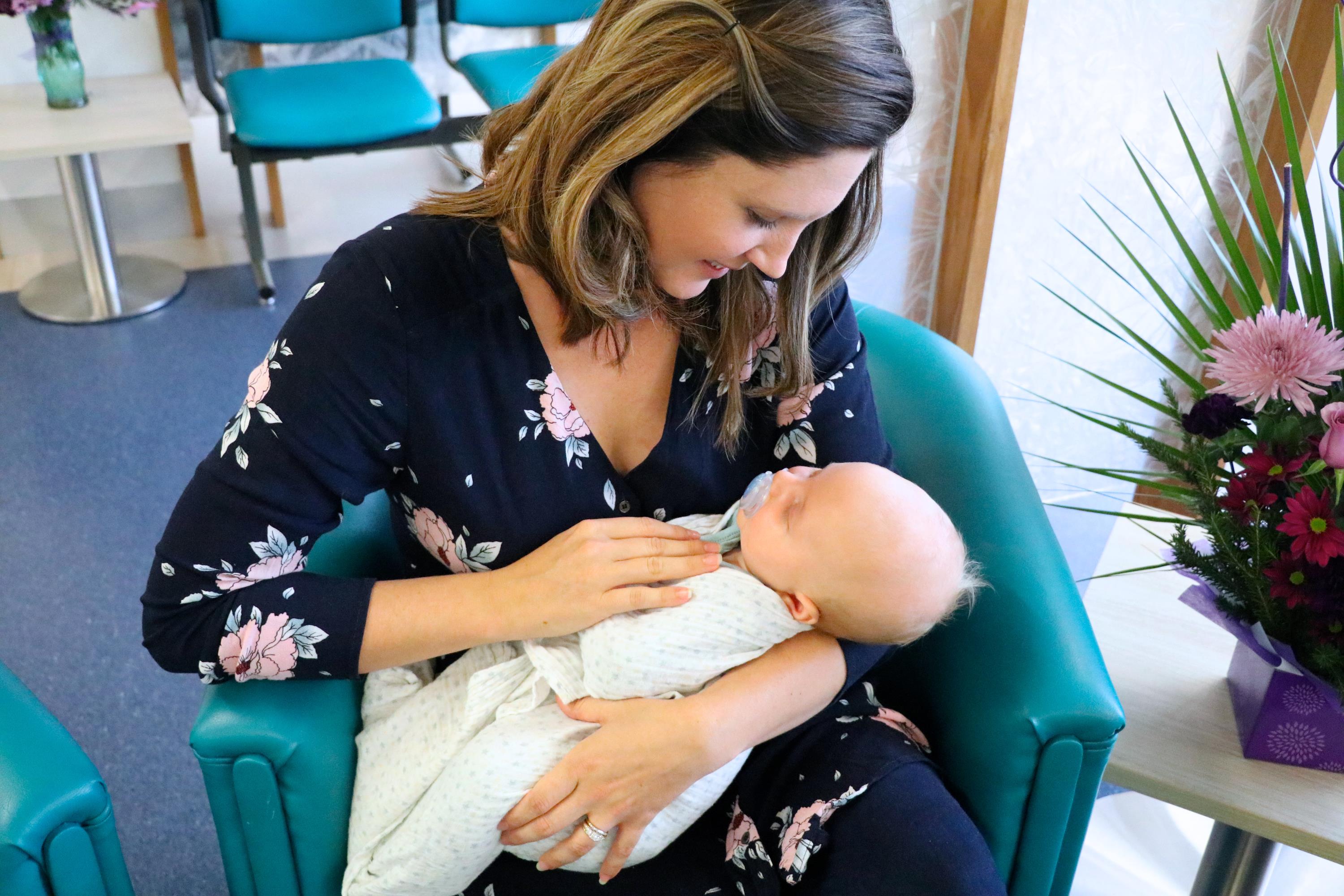
After Baby Arrives
The information below will help you to learn more about your postnatal care in hospital and when you take your baby home and also offers information and links about caring for your new baby
Postnatal unit
Tamworth Postnatal Unit
During your stay on the maternity unit, you will be supported by midwives who421899 will assist you to develop the skills to care for your baby and gain confidence as a new parent. There are educational films on the hospital television as well as inpatient education sessions on the ward such a baby bathing demonstration. These are all great opportunities to gain confidence as new parents. When you first arrive to the unit, the midwife caring for you will discuss a plan of care for your stay including discharge planning.
Accommodation options
Within hours of birth, you and your baby may go home if you are both well and your baby has fed. This enables you to be cared for in the comfort of your own home with supportive midwifery care provided by regular visits from the Home Midwifery Service (HMS). If you choose or need to stay in hospital, your care will be provided in the hospital's maternity ward. For most women, pregnancy and birth is a healthy experience, which does not necessitate a long stay in hospital. Women receiving care in the Midwifery Group Practice are expected to be discharged from the Birthing Suite 4-6 hours after birth. Admission to the ward will be facilitated only when medically indicated.
The Maternity Ward has some shared two-bed rooms. There are a number of single rooms available. Women with more complicated postnatal stays are allocated to the single rooms as first priority. We also attempt to meet the needs of women who have private health insurance by offering a single room whenever possible.
Rooming-in
It is important not to separate mothers from their babies, so mothers keep their baby at the bedside with them, 24 hours a day. The midwives will assist and provide support with all aspects of baby's care. Please ask for assistance if required. There is also a Mother and Baby Care Board near each bed which is a very useful way to request support. We also ask that this board is used to communicate with the staff if you are leaving the ward for any reason. We request that you write your mobile phone number and the approximate time of your return to the ward.
Feeding your baby
The midwives caring for you are able to give assistance, support and advice with breastfeeding. If additional help is required, the midwife caring for you will make arrangements for you to meet the lactation consultant midwife. If you are artificially feeding your baby, you will need to bring a tin of your choice of infant formula with you, sterile bottles and teats, to use in hospital.
Support for breastfeeding your baby when you go home:
- Home Midwifery Service midwives will provide assistance during the first few day.
- Breastfeeding Clinic is available for women with a baby less than 6 weeks old. For women with an Aboriginal or Torres Strait Islander baby, you can access the clinic up to the baby reaches 6 months of age. For appointments please telephone 0447759891 in business hours or text any time and will respond in business hours: 0447759891.
- The Australian Breastfeeding Association (ABA) provides breastfeeding support in the community. 24-hour phone number: 1800 6862686 (1800 MUM 2 MUM); while membership supports this valuable organisation, non-members can still receive support
- Child and Family Health Nurse provides long-term ongoing feeding and parenting support. You will be linked to this free service before discharge from our maternity service.
Look for Who Can I Call? in your postnatal pack for useful phone numbers.
Physiotherapy after your birth
A referral to a physiotherapist can be organised by speaking with your Midwife or Nurse.
Routine screening for your baby
Routine screening as outlined in the NSW Health Having a Baby book will be done in the early postnatal days. A Midwife or Doctor will examine your baby’s hips to check for any hip problems. You will be offered a screening test for hearing for your baby soon after birth. About one to two babies out of every 1000 will have a significant hearing loss. This screening program is called the NSW State-wide Infant Screening Hearing program (SWISH), and is available in the postnatal ward at your local Early Childhood and Family Centre if you go home early.
Newborn Bloodspot Screening will be done around day 3-4 by your midwife or nurse.
Transport for going home
Please plan for your transport home. You will need an approved baby restraint fitted to your car. Ideally this should be in place around 34-36 weeks pregnant. The Transport NSW website can help you locate a fitting station near you.
Discharging Home
Discuss with your midwife your needs for discharge. Ensure that you arrange on the previous evening for someone to collect you.
Please note: Discharge time on the postnatal ward is between the hours of 9am - 10am.
Home Midwifery Service (HMS)
For most women, pregnancy and birth is a healthy experience. We understand you need to share this exciting time with your family. Rather than stay in hospital after your baby is born, you may prefer to take advantage of our free Home Midwifery Service (HMS). If you are from out of area and choose to go home early, discuss your options with the midwife caring for you, alternate arrangements can be organised for you to have postnatal follow-up.
The HMS midwife will:
- visit you in the comfort of your own home giving you one-to-one advice and support
- visit between 9.30 am and 4 pm
- text message you on the morning of your planned home visit with an estimated time of arrival
- support you with feeding your baby
- advise you on helping your baby to sleep
- support with caring for your baby, eg: bathing
- weigh your baby
- perform blood tests for your baby
- complete your postnatal check
- provide you with support and reassurance
- put you in contact with the Child and Family Health Nursing Service.
You may choose to use this service directly from the Birth Suite or within a couple of days of having your baby
Mothers with babies in SCN
Sometimes babies requiring care in the SCN may need a longer hospital stay than the mother. In these instances the mother will be discharged from hospital before the baby. For families who live out of area, limited accommodation may be available with Ronald McDonald House.
Postnatal timeline
Postnatal timeline
| Time after birth of baby | Care for baby | Care for mother |
|---|---|---|
| Birth Day | Vitamin K (Konakion) Immunisation – Hepatitis B Newborn baby check
| Consent required |
| 1-5 days | Hearing check
| Consent required |
| 1-5 days | Hip check
| |
| 3-4 days | Newborn bloodspot screen
| Signed Consent required |
| 5-42 days | Breastfeeding Clinic
| |
| Approx 2 weeks | Home visit by Child and Family Health Nurse (C&FHN)
| |
| 2 weeks | Visit your GP
| |
| 6 weeks | Visit your GP
|
Keeping you and your baby safe while in hospital
Keeping you and your baby safe while in hospital
Sometimes mothers to be and new mothers can fall while in hospital and cause injury particularly if they are tired, or if they have recently had an anaesthetic (including an epidural), pain medication or heavy bleeding or if the mum to be or new mum has other medical conditions such as low blood pressure, epilepsy or diabetes.
We request that you:
- Use your call bell if you require assistance
- Wear safe footwear at all times
- Take your time when moving about
- Use a shower chair when showering
- Use a light as required during the night time.
It's important also to keep your baby safe from falling. We ask you to ensure that your baby:
- Is placed on their back to sleep and placed in their own cot placed next to your bed
- Is never left unattended on an adult bed or other surface from which they can fall
- Is always in their own cot while being transported. Walking around with your baby in your arms is not encouraged.
WE DO NOT ENCOURAGE SLEEPING WITH YOUR BABY AS BABIES CAN FALL OR HAVE SLEEP ACCIDENTS
Please ensure that visitors are aware of these important factors to keep your baby safe.
We recognise that babies like to feel safe in their mum's arms, but sometimes tired mums can fall asleep with their babies and babies can then easily fall from their mums' hold. We ask that you avoid all of these situations that place your baby at risk of falls.
REMEMBER the safe sleeping SIDS prevention = Baby on back, in own bed, feet at end of cot, smoke free environment, no hats or bonnets, and breastfeed your baby.
See more at https://rednose.com.au/section/safe-sleeping
After birth care
After birth care
Contraception
It is possible to fall pregnant immediately after giving birth even if you are breastfeeding.
If you do not desire to fall pregnant then consider using barrier contraception (condoms). You may resume sexual activity as soon as you feel comfortable. You may need to wait longer if you had a vaginal birth requiring stitches, or a caesarean birth.
If you are breastfeeding then it is important not to start the combined oral contraceptive pill as it may affect your milk supply.
Your options will include progesterone-only pills (the mini pill), a progesterone implant or progesterone injection given every third month.
Ask your GP/obstetrician/midwife for more information at your six-week appointment.
Feeling unwell
If you are feeling unwell please contact your GP or local Maternity Service.
General signs of infection include:
- Pain
- Redness
- Swelling
- Discharge that may have an unpleasant odour
- Temperature
- Area may be hot to touch
If you are breastfeeding and find painful areas that are red and lumpy you may have blocked milk ducts or be developing mastitis (infection of the milk ducts).
In this case you should to see your GP as soon as possible, however keep breastfeeding/expressing for until your appointment time as it may help to relieve the blockage.
Postnatal follow up with your GP
We recommend that you and your baby visit your local GP within two weeks after birth.
At this appointment:
- Organise a six-week appointment for a postnatal check
- Your baby should have a complete routine head-to-toe check up
- Discuss contraception with you GP
- Have a plan when your next pap smear is due
- Discuss current medications and follow-up scripts required
- Have perineal suturing reviewed or Caesarean wound check
- Discuss any discomforts that you may be experiencing including incontinence
- Discuss your emotional well being
You will need to organise another follow-up with your GP in six weeks for another routine postnatal check.
A full complete postnatal review should be attended at this appointment which may include:
- Blood tests (as required)
- Breast check
- Blood pressure
- Pap smear
- Perineal stitches or caesarean section wound
- Discuss any incontinence you may be experiencing
- Emotional well being
